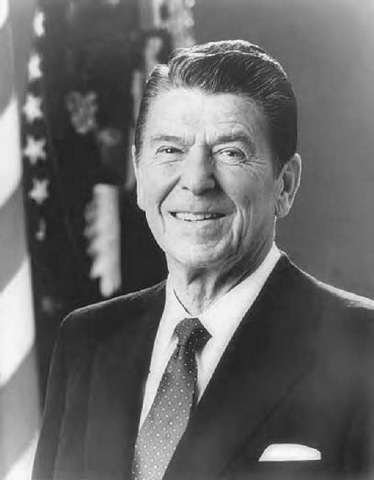Hollywood actor and president of the United States from 1981 to 1988, Reagan was arguably the most able propagandist ever to occupy the White House. Born in Illinois in 1911, Reagan formed his political views during the Republican domination of American politics following World War I. He worked as a sports announcer at a local radio station, where he invented the play-by-play commentary to match the wire description of baseball games in other cities. In 1937, while in Hollywood on a baseball assignment, he took a screen test at Warner Brothers and subsequently became a leading man for that studio. Although a number of Reagan’s films fall into the category of propaganda—for example, the pro-British International Squadron (1941) and wartime shorts and informational films made for the U.S. military—far more significant than his film roles was his work as president of the Screen Actors Guild beginning in 1947. In this capacity Reagan became a prominent anti-Communist voice, supporting the investigations of the House Committee on Un-American Activities (HUAC). He also acted as corporate spokesman for the General Electric company.
Ronald Reagan, official presidential photograph.
Reagan’s marriage to actress Nancy Davis (1923- ) in 1952 linked him to one of the most powerful political families in California’s Republican Party. He first appeared nationally in 1964, rallying the party faithful to endorse Senator Barry Goldwater’s (19091998) bid for president. In 1966 Reagan won the governorship of California (he served until 1975) and achieved a national reputation as a hard-line conservative by clamping down on student activism and the anti-Vietnam War movement. He became a perennial contender for the Republic presidential nomination, which he finally won in 1980. Reagan’s blend of down-home charm and Cold War saber-rattling fitted the mood of the times, especially since former president Jimmy Carter (1924- ) had appeared weak as a result of the Iranian hostage crisis and the Soviet invasion of Afghanistan in 1979. One TV ad featured a sinister Soviet bear crashing through the woods, while another asked pointedly: “Do you think the Soviets would have invaded Afghanistan if Ronald Reagan had been President?” Reagan excelled in the televised debates with Carter, demolishing the president with the perfectly timed dismissive line: “There you go again.”
Once in office, Reagan invested heavily in U.S. propaganda overseas, appointing his trusted friend Charles Z. Wick (1917- ) to the directorship of the United States Information Agency (USIA) and endorsing such propaganda initiatives as Radio Marti broadcasts to Fidel Castro’s (1926- ) Cuba. Reagan’s multimillion-dollar Strategic Defense Initiative (SDI)—nicknamed “Star Wars” by the Democrats—had a strong propaganda component, functioning better as a psychological lever to force the Soviets back into arms talks than as a piece of technology. Reagan also used the U.S. military as an extension of the national image, committing it to short but highly visible missions, such as the liberation of the island of Grenada in 1983. The Reagan administration also aided anti-Communist regimes and guerrilla movements in Central America. This commitment required a considerable White House propaganda effort to minimize the links between America’s allies in the region and “death squads.” One important conceptual breakthrough in U.S. propaganda was due to Jeane Kirkpatrick (1926- ), a professor of international relations and ambassador to the UN, who argued that there was a difference between Communist totalitarian and the authoritarian regimes sponsored by the administration, since the latter were capable of reform at a later date.
At home Reagan earned the nickname “the Great Communicator.” Despite widening social inequalities during this era, he achieved broad popularity. He successfully dramatized the doctrines of the “neoconservative” writers of the era, arguing that far from being the solution to America’s problems, “Government is the problem.” He “played the president” with the confidence of a great actor and won the 1984 presidential election by a substantial margin, insisting that America was once again “standing tall.” Reagan had substantial input into scripting his television speeches, developing a powerful rhetorical style that owed much to both Franklin D. Roosevelt (1882— 1945) (whom he greatly admired) and the Cold War rhetoric of Harry Truman (1884— 1972). Although he appeared to be speaking spontaneously, he was not at his best in im-provisational situations, on occasion requiring to be rescued by the first lady. Perhaps his best performance was his broadcast to the nation following the explosion of the space shuttle Challenger in 1986.
The later years of Reagan’s presidency witnessed a series of summits and a path-breaking disarmament treaty with Mikhail Gorbachev (1931- ), the new Soviet leader. Despite various challenges, such as the scandal surrounding the Iran-Contra affair (which made headlines in 1986), Reagan left office in January 1989 with his reputation intact. In 1994 he announced publicly that he was suffering from Alzheimer’s, hoping that the revelation would increase public awareness of this debilitating disease.

